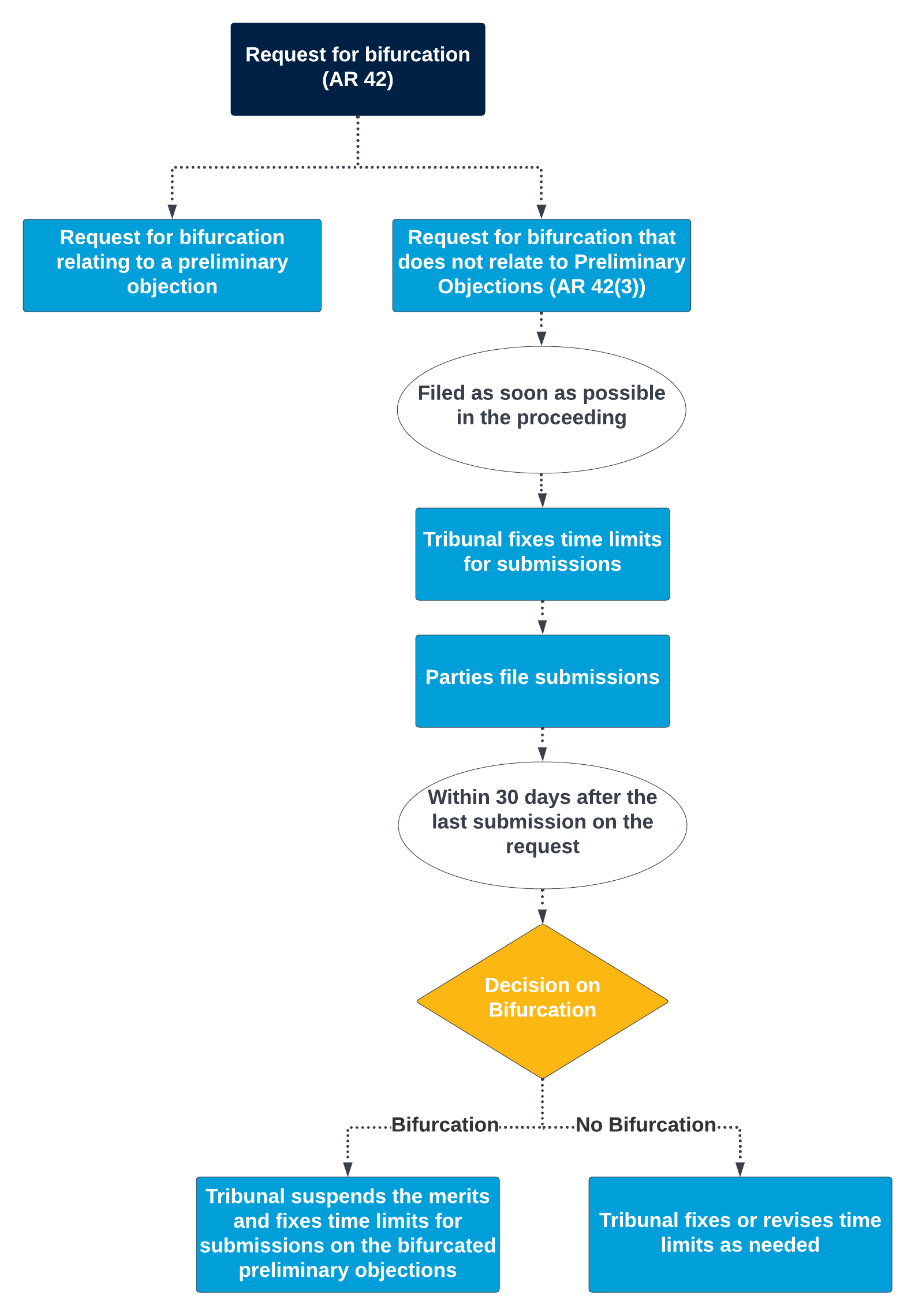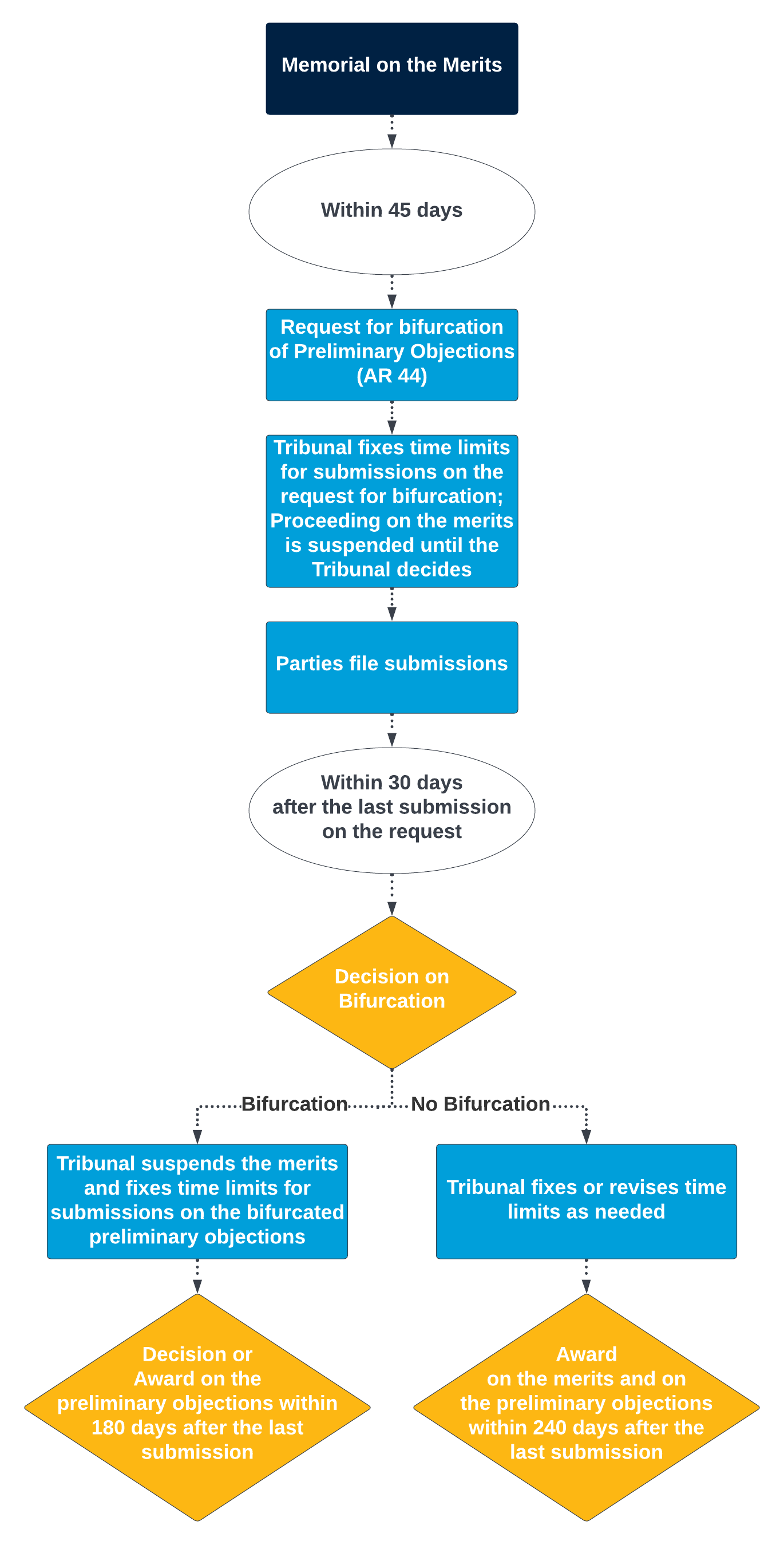Bifurcation - ICSID Convention Arbitration (2022 Rules)
Bifurcation refers to the separation of the proceeding into distinct phases addressing discrete issues. Most often bifurcation refers to the separation of jurisdictional issues from the merits of the dispute or liability issues from damages.
The Tribunal has discretion to bifurcate the proceeding into different phases, upon request of a party or on its own initiative (Arbitration Rule 42(6) and 43(4)). There is no presumption in favor of bifurcation. Tribunals consider all circumstances, in particular whether bifurcation would materially reduce the time and cost of the proceeding.
The ICSID Arbitration Rules distinguish between requests for bifurcation of preliminary objections (Arbitration Rules 43 and 44), and all other requests for bifurcation (Arbitration Rule 42). The Rules provide guidance on the timing, procedure and factors to be considered, but the parties may agree on a different procedure.
The time limit to file a request for bifurcation is sometimes discussed at the first session of the Tribunal. If the parties do not know whether a request will be made, a procedural calendar can be incorporated in Procedural Order No. 1 that anticipates several alternative scenarios, such as:
- the calendar to be followed if neither party requests bifurcation
- the calendar to be followed if a party request bifurcation and the Tribunal grants the request
- the calendar to be followed if a party requests bifurcation but the Tribunal decides to join all questions in one proceeding.
The Tribunal then adopts the procedural calendar given the applicable scenario (i.e., whether a request is made and whether it is granted or denied).
Request for Bifurcation of Issues other than Preliminary Objections (Arbitration Rule 42)
A party may request bifurcation of issues other than preliminary objections, e.g., that the Tribunal first determine liability before turning to the question of damages.
A request for bifurcation concerning questions other than preliminary objections must be filed as soon as possible and must identify the questions to be bifurcated (Arbitration Rule 42(3)). The Tribunal determines the briefing schedule in consultation with the parties. It must issue its decision within 30 days after the last submission on the request.
In deciding whether to bifurcate, the Tribunal must consider all relevant circumstances, including whether:
- bifurcation would materially reduce the time and cost of the proceeding
- determination of the preliminary objection would dispose of all or a substantial portion of the dispute
- the preliminary objection and the merits are so intertwined as to make bifurcation impractical.
If bifurcation is ordered, the Tribunal suspends the proceeding with respect to the questions to be addressed at a later phase, unless the parties agree otherwise (Arbitration Rule 42(5))

Request for Bifurcation of Preliminary Objections (Arbitration Rule 44)
Unless the parties agree otherwise, a party’s request for bifurcation of preliminary objections must be filed within 45 days after the filing of the memorial on the merits, or as soon as possible if the objections relate to facts that were unknown at the time of the memorial (Arbitration Rule 44(1)(a)). A request for bifurcation can also relate to preliminary objections concerning an ancillary claim (Arbitration Rule 44(1)(a)(ii) and 48).
The request for bifurcation must identify the preliminary objections to be bifurcated (Arbitration Rule 44(1)(b)). The Tribunal determines the briefing schedule in consultation with the parties. It must issue its decision within 30 days after the last submission on the request. During this time, the proceeding on the merits is suspended, unless the parties agree otherwise (Arbitration Rule 44(1)(c)).
In deciding whether to bifurcate a preliminary objection, the Tribunal must consider all relevant circumstances, including whether:
- bifurcation would materially reduce the time and cost of the proceeding
- determination of the preliminary objection would dispose of all or a substantial portion of the dispute
- the preliminary objection and the merits are so intertwined as to make bifurcation impractical.
A Tribunal may decide to bifurcate all or selected preliminary objections for separate determination.
If the Tribunal decides to address the preliminary objection in a separate phase of the proceeding, it suspends the proceeding on the merits, unless the parties agree otherwise (Arbitration Rule 44(3)).


